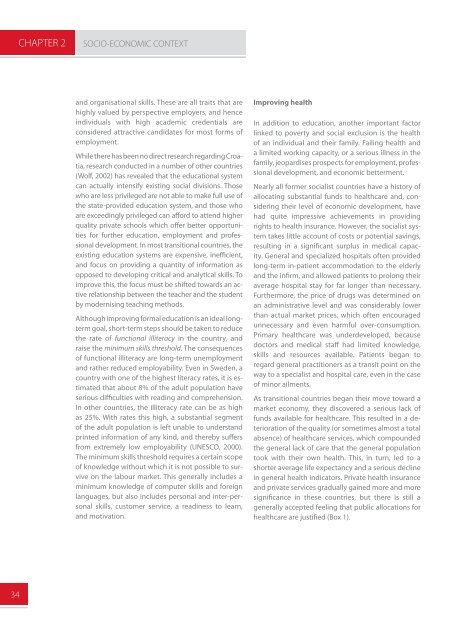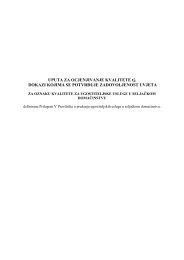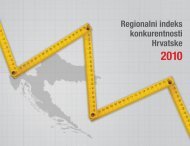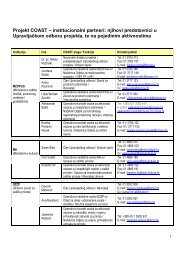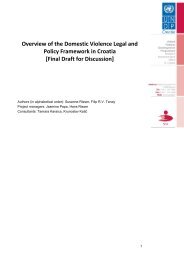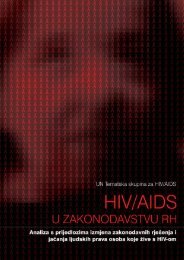WEB engleska verzija end.indd - UNDP Croatia
WEB engleska verzija end.indd - UNDP Croatia
WEB engleska verzija end.indd - UNDP Croatia
- No tags were found...
Create successful ePaper yourself
Turn your PDF publications into a flip-book with our unique Google optimized e-Paper software.
CHAPTER 2SOCIO-ECONOMIC CONTEXTand organisational skills. These are all traits that arehighly valued by perspective employers, and henceindividuals with high academic credentials areconsidered attractive candidates for most forms ofemployment.While there has been no direct research regarding <strong>Croatia</strong>,research conducted in a number of other countries(Wolf, 2002) has revealed that the educational systemcan actually intensify existing social divisions. Thosewho are less privileged are not able to make full use ofthe state-provided education system, and those whoare exceedingly privileged can afford to att<strong>end</strong> higherquality private schools which offer better opportunitiesfor further education, employment and professionaldevelopment. In most transitional countries, theexisting education systems are expensive, inefficient,and focus on providing a quantity of information asopposed to developing critical and analytical skills. Toimprove this, the focus must be shifted towards an activerelationship between the teacher and the studentby modernising teaching methods.Although improving formal education is an ideal longtermgoal, short-term steps should be taken to reducethe rate of functional illiteracy in the country, andraise the minimum skills threshold. The consequencesof functional illiteracy are long-term unemploymentand rather reduced employability. Even in Sweden, acountry with one of the highest literacy rates, it is estimatedthat about 8% of the adult population haveserious difficulties with reading and comprehension.In other countries, the illiteracy rate can be as highas 25%. With rates this high, a substantial segmentof the adult population is left unable to understandprinted information of any kind, and thereby suffersfrom extremely low employability (UNESCO, 2000).The minimum skills threshold requires a certain scopeof knowledge without which it is not possible to surviveon the labour market. This generally includes aminimum knowledge of computer skills and foreignlanguages, but also includes personal and inter-personalskills, customer service, a readiness to learn,and motivation.Improving healthIn addition to education, another important factorlinked to poverty and social exclusion is the healthof an individual and their family. Failing health anda limited working capacity, or a serious illness in thefamily, jeopardises prospects for employment, professionaldevelopment, and economic betterment.Nearly all former socialist countries have a history ofallocating substantial funds to healthcare and, consideringtheir level of economic development, havehad quite impressive achievements in providingrights to health insurance. However, the socialist systemtakes little account of costs or potential savings,resulting in a significant surplus in medical capacity.General and specialized hospitals often providedlong-term in-patient accommodation to the elderlyand the infirm, and allowed patients to prolong theiraverage hospital stay for far longer than necessary.Furthermore, the price of drugs was determined onan administrative level and was considerably lowerthan actual market prices, which often encouragedunnecessary and even harmful over-consumption.Primary healthcare was underdeveloped, becausedoctors and medical staff had limited knowledge,skills and resources available. Patients began toregard general practitioners as a transit point on theway to a specialist and hospital care, even in the caseof minor ailments.As transitional countries began their move toward amarket economy, they discovered a serious lack offunds available for healthcare. This resulted in a deteriorationof the quality (or sometimes almost a totalabsence) of healthcare services, which compoundedthe general lack of care that the general populationtook with their own health. This, in turn, led to ashorter average life expectancy and a serious declinein general health indicators. Private health insuranceand private services gradually gained more and moresignificance in these countries, but there is still agenerally accepted feeling that public allocations forhealthcare are justified (Box 1).34


